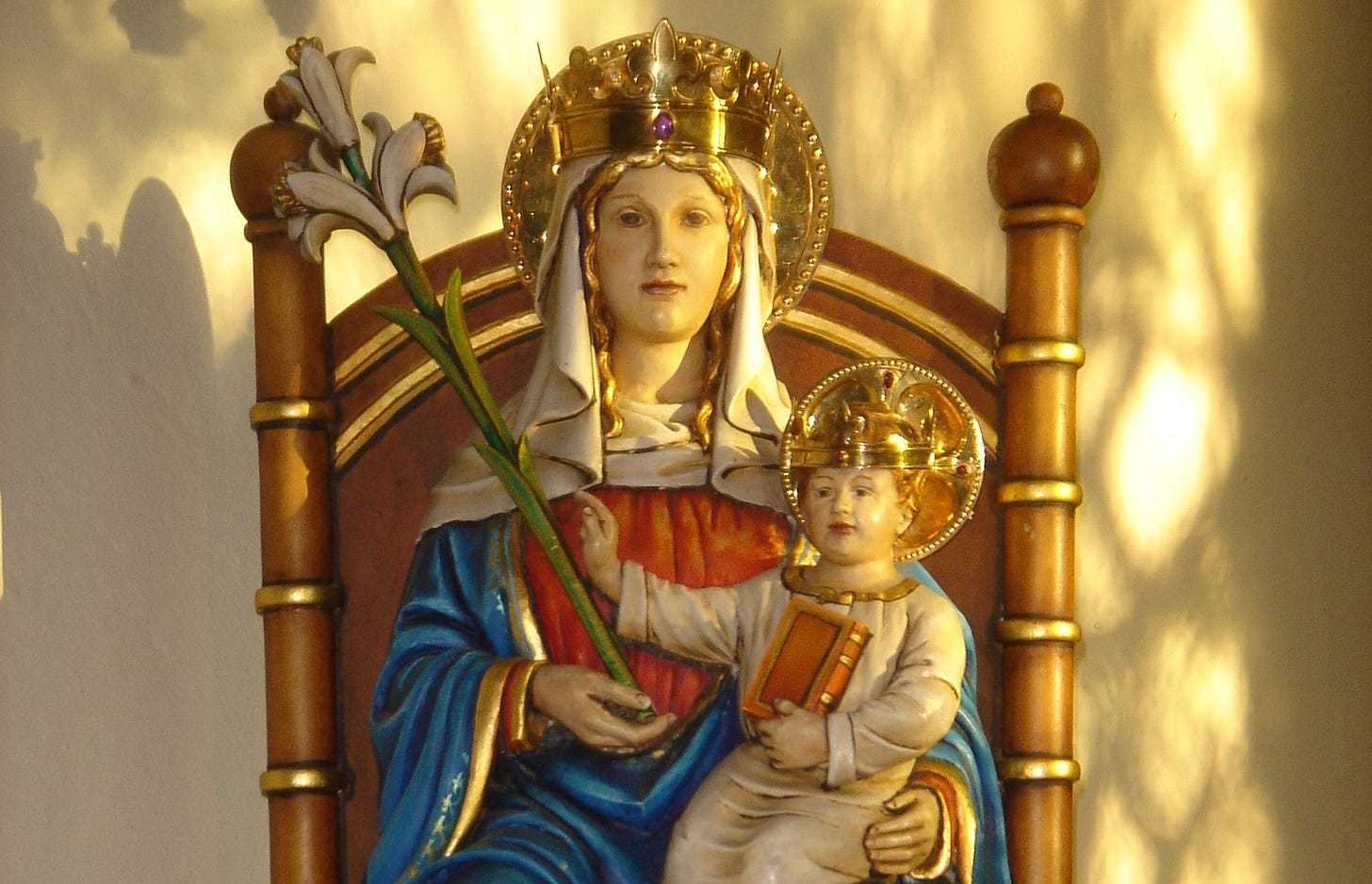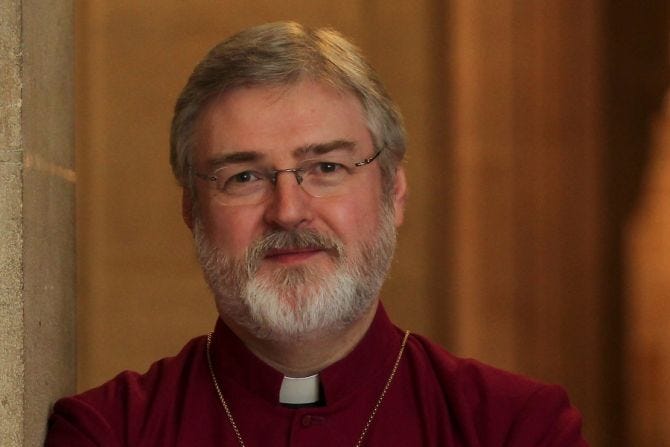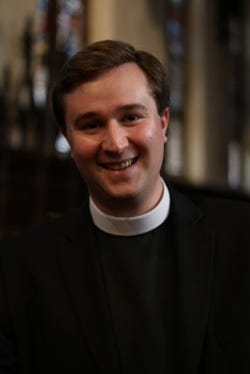

Jonathan Goodall, the Anglican Bishop of Ebbsfleet, announced last week that he will step down from his office on September 8, and that he intends to enter full communion with the Catholic Church.
Goodall said the Church of England had “shaped and nourished” his faith and that his decision, made together with his wife, is “a way of saying yes to God’s present call and invitation, and not of saying no to what I have known and experienced in the Church of England, to which I owe such a deep debt.”
He is the fourth Church of England bishop, and the second bishop of Ebbsfleet, to leave the Anglican communion and enter the Catholic Church since Pope Benedict XVI promulgated Anglicanorum coetibus in 2009. The document created personal ordinariates for Anglicans entering the Catholic Church — effectively, structures which would enable Anglicans to retain much of their own liturgical and pastoral culture while entering the Catholic Church.
Goodall has not said whether he intends to enter the Ordinariate of Our Lady of Walsingham in England, or even if he will seek ordination as a Catholic priest — other married former Anglican bishops have been ordained priests with a dispensation from the obligation to celibacy, including the current ordinary of the Ordinariate of Our Lady of Walsingham, Msgr. Keith Newton.
But how does an Anglican become a Catholic?
The Pillar talked with Fr. James Bradley, a former Church of England deacon, and now a Catholic priest. Bradley is Assistant Professor of Canon Law at the Catholic University of America.
Here’s what Fr. Bradley told us about Goodall’s announcement, and about his own journey of faith.
What is the context for Bishop Goodall’s announcement?
Well, he comes from the same kind of ‘homestead’ within the Church of England that I did.
He is a bishop who has been looking after traditionally-minded Anglicans for the last eight years. He has also been part of the Society of the Holy Cross for many years, which is a priestly society in the Church of England for Catholic-minded Anglicans.
In a sense, it seems to me has come to a kind of moment of decision, much like other people have done, having worked through what being an Anglican means in the currents of ecumenical dialogue.
There was the intention of all of these post-Vatican Council II dialogues and conversations about reunion between Anglicans and Catholics, but the excitement about that somewhat faded when the Church of England in particular, and the Anglican community more generally, adopted a different stance on matters of faith and morals than they had previously. And so they diverted from a common understanding of holy orders and sacraments and so on, which at some level had existed at some level between Anglicans and Catholics.
And I think that’s really why Pope Benedict saw the need:
Having made the decision, for instance, in the Church of England, that there were going to be women bishops, Benedict recognized that although the dialogue should and must continue — and the final call of that dialogue still must ultimately be full communion between the Catholic Church and the Church of England — he also recognized that was, short of a miracle, an impossible thing to achieve. Because you now had swathes of Anglican clergy who couldn’t ever be recognized as Catholic clergy [being ordained women], even if you got to the point of acknowledging Anglican orders.
How did you decide to become a Catholic?
I became a Catholic in 2011, with the erection of the Personal Ordinariate of Our Lady of Walsingham, but before that I would say I had been convinced for several years of the theological and doctrinal claims of the Catholic Church.
I simply saw our situation in the Church of England as an accident of history — that we had broken away from the Catholic Church in its fullness in the 16th century. It was our job [as Anglican clergy] first of all to reclaim the Catholic identity of Christianity in England, in the Church of England, and to move that, as quickly as possible and as effectively as possible, towards the restoration of a full communion with the Catholic Church.
I’d been an Anglican seminarian in 2009, when Anglicanorum coetibus was promulgated and decided really at the time that this [communion with Rome] was something I should pursue, but it wasn’t possible to pursue it until 2011 because the ordinariate didn’t exist yet. So I continued on the path I had started, continuing my formation and being ordained a deacon in the Church of England.
I began a curacy in a parish in Kent, in the diocese of Rochester, which had been St. John Fisher’s diocese, and I was with a parish priest who was very sympathetic to all of this. And in the end, when the ordinariate was set up, we came into the Catholic Church together with 40 of our parishioners. That kind of thing was the intention of the ordinariate.
I was very fortunate that when I became a Catholic, my parents and my sister decided to do so too. That certainly made the decision easier, at an emotional level. That was a great grace, as has been the continuing presence of Our Lady of Walsingham and St. John Henry Newman. Those two figures accompanied me from Canterbury to Rome, as it were. And I’m grateful for that.
The ordinariates are home for Anglicans who decide to become Catholic. But are they also a recognition of the limits of ecumenical dialogue? Are the ordinariates sometimes perceived or framed by Anglicans as an impediment to ongoing ecumenical dialogue?
I think it’s a matter of justice that people continue to have serious conversations and look towards the possibility of a full reconciliation [between Anglicans and Catholics]. But I think it’s also a recognition of the reality of the situation.
In his very first address as pope, Benedict acknowledged this: He said we need to have concrete gestures towards realizing an ecumenical vision. If it is the will of Christ that all should be one, then we must do something about it. And we must do concrete things, we can't just talk about it.
Dialogue is all very good, it's important. But we can't just be Christians to each other, we have to be Christians with each other. That means actually doing something.
The ordinariates are an example of how Benedict, as the successor of Peter, had all this weighing very heavily on his mind, and having been in the Congregation for the Doctrine of the Faith for years whilst all of this was being discussed from the 1970s onwards, and him recognizing that something needed to be done.
We don’t know if Jonathan Goodall is going to join the ordinariate or attend the local Catholic diocese, or in what capacity, but that is his own journey.
But certainly how I feel, and how members of the ordinariate feel, is we are tremendously grateful for all of the graces that we received and opportunities that we have had, which led us to be able to come into the Catholic Church with a sense of who we are, and with a Christian patrimony that's nourished us and is there now as a treasure to be shared with the whole Church.
You talk about the elements of Anglican patrimony offered by Catholics who come into communion with the Catholic Church. A lot of Catholics, even a lot of Catholic bishops, probably cannot put their finger on what that patrimony actually is.
I recall Cardinal Francis George saying in 2011 “I’m not sure I’ve ever seen an explanation of what the elements [of Anglican patrimony] might be.”
So what do you mean when you talk about the Anglican patrimony?
Well, I think in the United States, the experience of most Catholics with Anglicanism is very different from the experience of most Catholics with Anglicanism in England and the Commonwealth countries.
First of all, the fact that the Church of England is by law established in England as the state church means that it's the predominant expression of the Christian faith in the country; even if attendance numbers fluctuate, it's still very much part of society. Anglicanism in the United States is confessional. It's not in England, it's the default.
If you're a Christian in England, you’re likely to be an Anglican; if you're a Christian in the United States, you could be anything, and, in fact, you'll most likely to be a Catholic.
Anglicanorum coetibus talks about the liturgical, pastoral and spiritual traditions of the Anglican communion, and I would say that that's a good starting point.
While the liturgical traditions are perhaps the most visible and perhaps the most important, the nature of the liturgy is that it points to something more fundamental. And I think that's a kind of distinctive Anglican ethos.
I describe that ethos as the “virtue of religion.”
I always use the example of the Sunday obligation. Catholics go to Mass on Sunday because the law tells you to go to Mass on Sunday. Anglicans go to church on Sunday because, well, you go to church on Sunday. And I think that’s an example of the “virtue of religion” at work — a kind of instinctive orientation toward religion. Look at the prayers in the Anglican tradition — they’re all full of language about heaven, and beatitude, and coming to meet the Lord, and looking toward the coming of Christ. It’s all full of beatitude.
That disposition, of course, is there in the Catholic tradition, but it’s presented and preserved in the Anglican tradition in a certain way — in hymns and language and the quality of worship.
The Anglican patrimony — a kind of approach to law, to liturgy to the Christian life, to virtue, all the best sorts of things — is not at odds with Catholic faith, and it's not even something that's unique, but it’s just been preserved and articulated in a particular way in the history and the classical tradition of Anglicanism.
Archbishop Justin Welby, the Archbishop of Canterbury announced on Friday that Bishop Goodall's service as Anglican Bishop of Ebbsfleet will end on September 8. So it sounds like he will remain in Anglican ministry until then and maybe lead Anglican liturgies along the way.
That strikes me as surprising— because it might mean continuing to offer Anglican liturgies after accepting that the Catholic Church regards Anglican orders as invalid.
And I wonder, for you, as an Anglican deacon, did you come to a point at which you realized that your orders were not sacramentally valid, but you continued for a time in ministry? And if so, what was that like?
That’s a very good question. I can only speak personally, but I would say that my personal experience of it was that I came to an intellectual decision, an intellectual understanding of the Church’s teaching on the validity of Anglican orders, which allowed me to say with all confidence when I became a Catholic that I believe everything that the Church teaches to be true.
I just didn’t come to the emotional understanding of that until sometime later, when I had experienced for some time the grace and peace that comes from life in the Church and the sacramental life in its fullness. But I was a deacon, not a priest, in the Church of England, so I never had any qualms about what I was doing [liturgically] on the day before I became a Catholic.
I remember in the Church of England, we argued strenuously for ‘sacramental assurance.’ We wanted to know that the ministers that we went to were truly ordained and could validly offer the sacraments as we understood it.
We’d argued for this sacramental assurance, and, I remember someone saying at the time of my conversion, ‘that's all the Catholic Church was asking of us,’ and I thought ‘That's right. I demanded this of the Church of England and now the Catholic Church is demanding it of me, and I shouldn't say no to that.’
I was quite happy to say that if I accept that the Catholic Church is the Church, then I have to also accept everything that she teaches on these issues; I have to accept her judgment about the validity or otherwise if Anglican orders. It wasn’t a question of crossing my fingers, or saying ‘I accept it but…’ or anything like that.
I came to understand it at a deeper level, not just an intellectual level, but at a kind of emotional level as well. I had no difficulty making that decision once I’d come to the realization that the Church has the authority to decide these things.
Your conversion story evidences something very interesting: You seem to say that within liturgical and ritual experiences which were not sacramental, you experienced real grace, which brought you deeper into the mystery of the Church, and thus closer to becoming a Catholic.
What is your experience of grace in an ecclesial communion which is not the Church, and in liturgical experiences which are not the Mass?
I can look back now and I can identify very clearly, not just themes, but moments, interactions, personalities, that were milestones on the journey to becoming Catholic and to where I am now.
I think it will continue to reveal itself to me as I grow older, but I’ve been kind of thinking about my faith journey, and it's something that I've been very conscious of: That there were things that happened in my life — places that I went to a church or school or visited, experiences that I had as a musician, seeing cathedrals and all of these sorts of things — all of which I can see now were preparing the ground for me life as a Catholic and a life as a priest.
I think we often take grace for granted because it’s so super-abundant. We experience it all the time in such wonderful ways, but when you have an opportunity to stop and look back and see what the Lord has done, it’s in those moments that you realize the effect and the importance of that grace.
Certainly I can see the Lord’s hand sort of steering things all the way through those years for me. I mean, in extraordinary things: I was a deacon in St. John Fisher’s diocese, and then when I became a Catholic, I lived in the parish that Thomas More had lived in. I went to a school where the Anglican parish priest at the church had once been the young Cardinal Henry Edward Manning. All of these sorts of things I can look back on and see where the Lord was working. Even if at the time I had no idea, it’s kind of comforting, actually.
Jonathan Goodall is 60 years old, and so he’s not just leaving behind a job, or even a faith tradition, but an entire life — because his entire life, no doubt, has been the Church of England. What is the social significance of his announcement for him personally? What was it like for you?
St. John Henry Newman famously talked about the parting of friends at his conversion. And I have to say that that’s something that I experienced, too, and it pains me to this day.
There are people who I thought were very close friends, whom I haven’t spoken with in 10 years. We haven’t had a row, we haven’t had any falling out, we just stopped talking to each other. We just stopped being in touch, either immediately, or soon after [my decision to become a Catholic]. There are other people who have been much more at ease with it.
It was difficult. I’d never met a Catholic, I never consciously met a practicing Catholic until I went to university. I grew up not knowing any Catholics. The Catholic Church to me was this weird thing which I had never really known growing up. I only really got to know it after I became a Catholic.
I didn’t really know the culture, I didn’t know any people who were Catholic before I became one. So I am immensely grateful for the friendships that I’ve made and the peer groups, and particularly for the priests who have been very good about welcoming these prodigal sons who are late to the party.
But it’s immensely sad. I think about people who I was very close to, people I went on holiday with, I went on pilgrimages with, that I prayed with on a daily basis, and now I have no friendship with anymore. And that’s very difficult.
You know, I actually sent someone a message this morning saying: ‘You know, the road is long and windy, and the journey is pretty difficult. And when you get here, sometimes you feel like you’re sitting in the sort of remains of a desolated formerly glorious city, just like St. Gregory the Great at the end of the Roman empire,’ but, I said, ‘but my word, I don’t have any regrets.’
Despite all of that, despite the difficulties, despite the friendships and things that you lose — and that is sad, and I still feel it — there’s nothing like being a Catholic. And I wouldn’t give it up for anything or anyone.
I get excited when I wake up in the morning and think: ‘I get to say Mass today.’ I still get tremendously excited about that each day.




